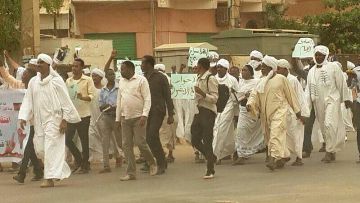Weak turnout at Umma party protest against al-Mahdi’s detention
May 23, 2014 (KHARTOUM) – Sudan’s riot police used tear gas on Friday to disperse a peaceful demonstration organised by the National Umma Party (NUP) in the capital twin city of Omdurman to demand the release of its leader al-Sadiq Al-Mahdi.

Police forces surrounded the Imam Abdel Rahman Mosque in Wad Nubawi where more than 1,000 people from the Ansar sect – the religious wing of the NUP – gathered to protest al-Mahdi’s arrest.
It also surrounded the NUP’s headquarters in Omdurman where more than 500 of the party members gathered to protest the detention of their leader.
Al-Mahdi was arrested last week, days after he was called for questioning by state prosecutors over statements he made accusing the Sudan’s paramilitary unit known as the Rapid Support Force (RSF) of committing abuses against civilians in Darfur and Kordofan regions.
He was charged on several counts, including undermining the constitutional order and opposing the regime through force. Those charges are punishable by death, life imprisonment and sentences ranging from a few months to several years and confiscation of money.
The demonstration, which was led by the NUP leaders, held banners calling for the immediate release of al-Mahdi and suspension of the dialogue with regime. The protestors shouted “no dialogue with the villains”, “the voice of Al-Mahdi is the voice of the people”, and “we won’t endorse anyone but Al-Mahdi”.
The NUP leaders delivered speeches at their party’s headquarters denouncing the arrest of Al-Mahdi and calling for his release, underscoring the need to suspend participation of the party in the government-led dialogue.
Meanwhile, the opposition alliance of the National Consensus Forces (NCF) has agreed with the NUP to dismantle the regime through all means of civil struggle and establish an alternative regime which could achieve comprehensive peace and full democratic transformation.
The NCF and the NUP, in a meeting held on Thursday, announced support for al-Mahdi’s remarks that the Sudanese security apparatus violates the constitution by establishing militias even though its mandate is limited to gathering and analysing intelligence, demanding investigation on the violations attributed to SRF in Darfur and Kordofan.
The two sides agreed to form a committee of solidarity with al-Mahdi allowing all components of the society and regional and international organisations to join it in order to pressure the government for the release of al-Mahdi.
The RSF militia, which is widely known as the Janjaweed militias, were originally mobilised by the Sudanese government to quell the insurgency that broke out in Sudan’s western region of Darfur in 2003.
The militia was activated and restructured again in August last year under the command of NISS to fight rebel groups in Darfur region, South Kordofan and Blue Nile states following joint attacks by Sudanese Revolutionary Front (SRF) rebels in North and South Kordofan in April 2013.
Sudanese officials say the RSF is part of the NISS but operationally follow the army.
The NCF disclosed in a press release that they submitted a request to meet al-Mahdi at his prison.
AL-MAHDI’S TRIAL
Meanwhile, Sudan’s information minister and government spokesperson, Ahmed Bilal Osman, announced on Friday that Al-Mahdi will be presented before a court, underscoring that the latter sought to circumvent the national dialogue.
He said on a talk show broadcasted by the state-run Radio Omdurman on Friday that al-Mahdi’s criticism for the RSF was intended to cover internal problems within the NUP.
“Al-Mahdi went out of context when he spoke about the RSF which necessitated filing criminal complaint against him by the National Intelligence and Security Services (NISS)”, he added
Osman emphasised the RSF is a disciplined regular force which operates under the command of the Sudanese army, saying it achieved many victories and successes.
He pointed out that the role of the RSF is to secure the society and the state.
The information minister further said they wouldn’t suspend the application of the law in order to secure success of the national dialogue.
(ST)

